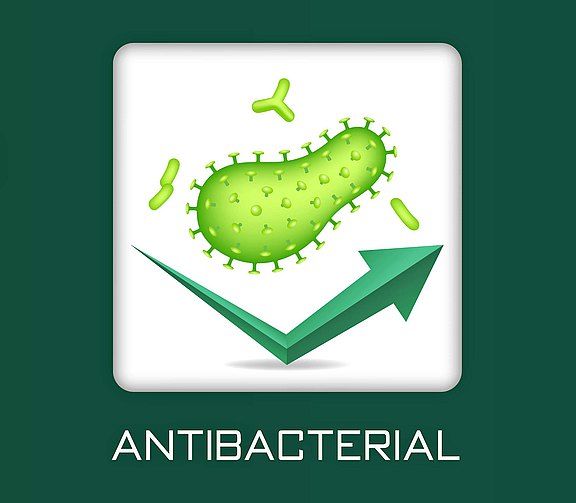Antibacterial finishing of plastics
An antibacterial, fungicidal or bacteriostatic finish of plastics is desired in many areas, e.g. medical technology, textiles, household goods and food packaging.
The functionalisation of polymer materials with antibacterial additives (depending on the additive, bactericidal, but also fungicidal or virucidal) is the focus of plastics research at the TITK.
The antibacterial treatment is achieved with innovative solutions developed and patented by the TITK. These solutions contain previously common active ingredients, such as metal ions, whose effect, however, is optimised by modified carrier polymers.
Alternatively, an antibacterial effect can also be achieved through antimicrobial peptides (AMPs).

In parallel, the TITK is working on innovative approaches to solutions that investigate the use of natural substances as antimicrobial substances or use bacteriophages as specifically antibacterial components in plastics.
Antiviral finishing of plastics
It is known that viruses can survive on inanimate surfaces for days, weeks or even months without losing their infectivity. The TITK has also been working on this problem for some time.
Within the framework of basic research, it was possible to apply virus-inactivating polymer coatings based on polyelectrolytic substances to plastic surfaces and to reliably prove their effectiveness using immunological methods. It turned out that the viruses are not only bound by the polyelectrolyte coatings, but their envelope proteins are effectively destroyed and an infection of the host cell can consequently no longer take place.
The offer of the TITK:
With the comprehensive competence of material development per se, process and technology development, which includes compounding, masterbatch production and semi-finished products (injection moulding, films, coating), as well as the possibility to also test corresponding products, the TITK offers the complete, individual solution development for customer-specific problems. Within the scope of research contracts, a series of OMPG tests can be realised by the TITK.
Publications
- Gladitz, Dr. Michael; Bauer, Dr. Janine; Griesheim, Stefanie; Reinemann, Dr. Stefan: „Biofilmprüfung prüfen und vermeiden“ Kunststoffe, 04/2020
- Gladitz, Dr. Michael; Griesheim, Stefanie; Bauer, Dr. Janine: „Dosierte Wirkstoffabgabe durch antimikrobielle Kunststoffoberflächen“ DeviceMed, 03.06.2019.
- Gladitz, Dr. Michael; Griesheim, Stefanie; Bauer, Dr. Janine:„Kein Raum für Erreger: Antimikrobielle Additive für Kunststoffprodukte“ DeviceMed, Jahrgang 15, Juli 2019, S. 44.
- Gladitz, Dr. Michael; Griesheim, Stefanie; Bauer, Dr. Janine: „Kein Raum für Erreger: Additive für Kunststoffprodukte“ DeviceMed Best of 2019, Jahrgang 15, Dezember 2019, S. 19.
Wiegand, C.; Völpel, A.; Ewald, A.; Remesch, M.; Kuever, J.; Bauer, J. et al. (2018): Critical physiological factors influencing the outcome of antimicrobial testing according to ISO 22196 / JIS Z 2801. PLoS ONE 13(3): e0194339. doi.org/10.1371/journal.pone.0194339